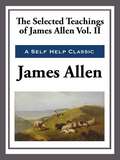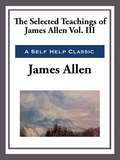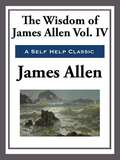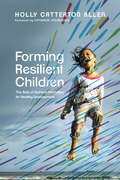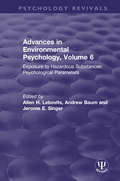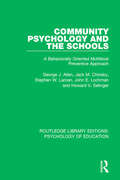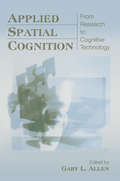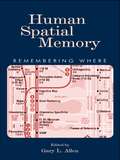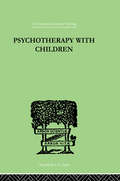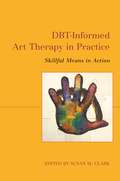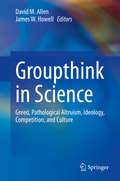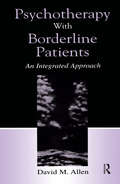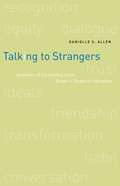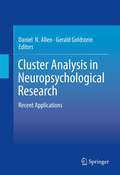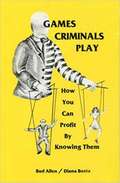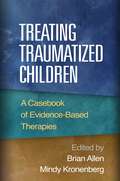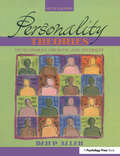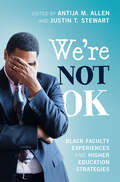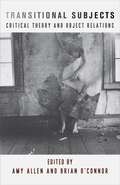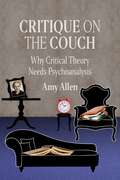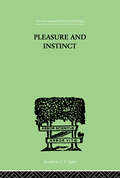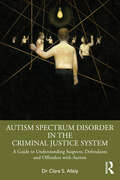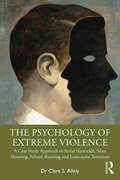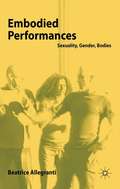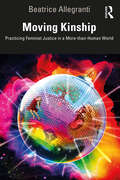- Table View
- List View
The Selected Teachings of James Allen Volume II
by James AllenJames Allen was one of our finest thinkers. In this 4 - in - 1 omnibus edition Allen show's you the power of positive thinking and a path to prosperity with dignity. These teachings are as timeless today as they were when they were written. Many of today's best sellers, such as The Power of Positive Thinking, Laws of Attraction, and The Science of Success, and The Secret owe a deep and abiding debt to these great works. Now you can read the words of the master. This edition includes: Eight Pillars of Prosperity Foundation Stones to Happiness and Success, The Shining Gateway, James Allen's Book of Meditations for Every Day in the Year
The Selected Teachings of James Allen Volume III
by James AllenJames Allen was one of our finest thinkers. In this 4 - in - 1 omnibus edition Allen show's you the power of positive thinking and a path to prosperity with dignity. These teachings are as timeless today as they were when they were written. Many of today's best sellers, such as The Power of Positive Thinking, Laws of Attraction, and The Science of Success, and The Secret owe a deep and abiding debt to these great works. Now you can read the words of the master. This edition includes: The Mastery of Destiny; As a Man Does: Morning and Evening Thoughts; Man: King of Mind, Body, and Circumstance; Out from the Heart; Men and Systems.
The Wisdom of James Allen
by James AllenJames Allen was one of our finest thinkers. In this 4 - in - 1 omnibus edition Allen show's you the power of positive thinking and a path to prosperity with dignity. These teachings are as timeless today as they were when they were written. Many of today's best sellers, such as The Power of Positive Thinking, Laws of Attraction, and The Science of Success, and The Secret owe a deep and abiding debt to these great works. Now you can read the words of the master. This edition includes: All These Things Added; The Life Triumphant: Mastering the Heart and Mind; From Passion to Peace; Light on Life's Difficulties; Through the Gates of Good, or Christ and Conduct; Poems of Peace.
Forming Resilient Children: The Role of Spiritual Formation for Healthy Development
by Holly Catterton AllenMany children today are growing up in the midst of adversity, whether brought on by family difficulties or larger societal crises. All children need to be able to deal with stress, cope with challenges, and persevere through disappointments. While we cannot protect children from all hardships, we can promote healthy development that fosters resilience. In this interdisciplinary work, Holly Catterton Allen builds a bridge between resilience studies and children's spiritual formation. Because children are spiritual beings, those who work with them can cultivate spiritual practices that are essential to their thriving in challenging times. This book equips educators, counselors, children's ministers, and parents with ways of developing children's spirituality to foster the resilience needed to face the ordinary hardships of childhood and to persevere when facing trauma. It offers particular insight into the spiritual experiences of children who have been hurt by life through chronic illness, disability, abuse, or disasters, with resources for healing and hope.
Advances in Environmental Psychology, Volume 6: Exposure to Hazardous Substances: Psychological Parameters (Psychology Revivals)
by Allen H. Lebovits; Andrew Baum; Jerome E. SingerIncreasingly frequent environmental exposures to hazardous substances present mental health professionals with groups and at times communities of people, faced with high levels of psychological threat. As a result of an increasingly industrial and technological society, a new type of group cohort has emerged – individuals exposed to hazardous substances that present the possibility of immediate and chronic threats to their health and their families’ health. Although the medical sequalae to such exposure had been established, little attention had been paid to the mental health issues or to possible integrated psychophysiological consequences. Originally published in 1986, this book focuses on reactions to exposure to toxic substances as well as some predictors of response in groups faced with increased medical risk subsequent to some of the most common and hazardous toxic exposures found at the time: radiation, toxic waste, asbestos, lead, contaminated water, and toxic chemical fire and leak.
Community Psychology and the Schools: A Behaviorally Oriented Multilevel Approach (Routledge Library Editions: Psychology of Education)
by George J. Allen Jack M. Chinsky Stephen W. Larcen John E. Lochman Howard V. SelingerOriginally published in 1976, this volume begins with a theoretical overview of the major trends in the community psychology movement at the time, as well as a perspective on how the field was developing. The emphasis is on the utility of combining a preventative community-centered orientation with an applied behavioral-analytic focus. The authors take general theoretical notions and demonstrate how they can be turned to concrete methods of dealing with specific practical problems that occur in implementing a ‘real-life’ program of community oriented intervention. The authors present an innovative model for developing a low cost and effective delivery system for mental health services in public schools. They describe the actual development and implementation of such a system in the school, and also include a comprehensive evaluative scheme for determining the efficacy of this type of endeavor. The actual behavior change strategies that are employed can be used effectively by teaching personnel or psychologists on either a large or small scale. A final unique feature of the volume is the inclusion of a program that will assist teachers and mental health professionals in helping elementary school students learn social problem-solving skills.
Applied Spatial Cognition: From Research to Cognitive Technology
by Gary L. AllenApplied Spatial Cognition illustrates the vital link between research and application in spatial cognition. With an impressive vista ranging from applied research to applications of cognitive technology, this volume presents the work of individuals from a wide range of disciplines and research areas, including psychologists, geographers, information scientists, computer scientists, cognitive scientists, engineers, and architects. Chapters throughout the book are a testimony to the importance of basic and applied research regarding human spatial cognition and behavior in the many facets of daily life. The contents are arranged into three sections, the first of which deals with a variety of spatial problems in real-world settings. The second section focuses on spatial cognition in specific populations. The final part is concerned principally with applications of spatial cognitive research and the development of cognitive technology. Relevant to a number of remarkably diverse groups, Applied Spatial Cognition will be of considerable interest to researchers and professionals in industrial/organizational psychology, human factors research, and cognitive science.
Human Spatial Memory: Remembering Where
by Gary L. AllenThe chapters in Human Spatial Memory: Remembering Where present a fascinating picture of an everyday aspect of mental life that is as intriguing to people outside of academia as it is to scientists studying human cognition and behavior. The questions are as old as the study of mind itself: How do we remember where objects are located? How do we remember where we are in relation to other places? What is the origin and developmental course of spatial memory? What neural structures are involved in remembering where? How do we come to understand scaled-down versions of places as symbolic representations of actual places? Although the questions are old, some of the answers-in-progress are new, thanks to some innovative theorizing, solid experimental work, and revealing applications of new technologies, such as virtual environments and brain imaging techniques. This volume includes a variety of theoretical, empirical, and methodological advances that invite readers to make their own novel connections between theory and research. Scholars who study spatial cognition can benefit from examining the latest from well-established experts, as well as milestone contributions from early-career researchers. This combination provides the reader with a sense of past, present, and future in terms of spatial memory research. Just as important, however, is the value of the volume as a touchstone resource for researchers who study perception, memory, or cognition but who are not concerned primarily with the spatial domain. All readers may find the fact that this volume violates the trend toward an ever-narrowing specialization refreshing. Chapters from cognitive psychologists are alongside chapters by developmentalists and neuroscientists; results from field studies are just pages away from those based on fMRI during observation of virtual displays. Thus, the book invites integrative examination across disciplines, research areas, and methodological approaches.
Psychotherapy with Children
by Frederick H. AllenFirst published in 1999. Routledge is an imprint of Taylor & Francis, an informa company.
DBT-Informed Art Therapy in Practice: Skillful Means in Action
by Emma Allen Jane DeSouza Yvette Duarte Penelope James Shelley Kavanagh Heidi Larew Scott Levson Melanie Paci Chloe Sekouri Megan Shiell Jeremy Steglitz Karin von von Daler Anthony Webster Mary Weir Tracela M. ZapataResponding to growing interest in DBT-informed art therapy, this edited guide focuses specifically on how these interventions can treat a variety of client groups. Combining the structure and skill development of DBT with the creativity and non-verbal communication of art therapy can be a significant advantage in treating patients who are resistant to talking therapy. This book includes international contributors who cover work with a wide variety of populations, such as those with suicidal behaviours, eating disorders, and personality disorders. Divided in two parts, Part I focuses purely on DBT-informed art therapy, whilst Part II brings in multi-modal DBT-informed approaches, such as poetry and movement, but all with visual art as a component.
Groupthink in Science: Greed, Pathological Altruism, Ideology, Competition, and Culture
by David M. Allen James W. HowellThis book discusses one of the hottest topics in science today, i.e., the concern over certain problematic practices within the scientific enterprise. It raises questions and, more importantly, begins to supply answers about one particularly widespread phenomenon that sometimes impedes scientific progress: group processes. The book looks at many problematic manifestations of “going along with the crowd” that are adopted at the expense of truth. Closely related is the concept of pathological altruism or altruism bias—the tendency of scientists to bias their research in order to further the ideological or financial interests of an “in-group” at the expense of both the interest of other groups as well as the truth. The book challenges the widespread notion that science is invariably a benevolent, benign process. It defines the scientific enterprise, in practice as opposed to in theory, as a cultural system designed to produce factual knowledge. In effect, the book offers a broad and unique take on an important and incompletely explored subject: research and academic discourse that sacrifices scientific objectivity, and perhaps even the scientist’s own ethical standards, in order to further the goals of a particular group of researchers or reinforce their shared belief system or their own interests, whether economic, ideological, or bureaucratic.
Psychotherapy With Borderline Patients: An Integrated Approach
by David M. AllenPatients with borderline personality disorder (BPD) or borderline traits are among the most difficult for mental health practitioners to treat. They present an incredible range of symptoms, dysfunctional interpersonal interactions, provocative behavior in therapy, and comorbid psychiatric disturbances. So broad is this array that indeed the disorder constitutes a virtual model for the study of all forms of self-destructive and self-defeating behavior patterns. Psychotherapy With Borderline Patients: An Integrated Approach fills the need for a problem-focused, clinically oriented, and operationalized treatment manual that addresses major ongoing family factors that trigger and reinforce the patient's self-destructive or self-defeating behavior. In it, David Allen draws on the theoretical ideas and techniques of biological, family systems, psychodynamic, and cognitive-behavioral therapists to describe an integrated approach to adults with BPD or borderline traits in individual therapy. Innovative, practical, and specific, the book * helps therapists teach their patients, through the use of various role-playing techniques, strategies to alter the dysfunctional patterns of interaction with their families of origin that reinforce self-destructive behavior or chronic affective symptoms; * explains the nature and origins of the characteristic oscillation of hostile over- and underinvolvement between adults with BPD and those who served as their primary parental figures during childhood; * elucidates the nature and causes of the dysfunctional communication patterns in patients' families that lead to misunderstanding; and * provides concrete, clearly spelled out advice for therapists about how to deal with provocative patient behavior, how to minimize distorted descriptions by patients of significant others, how to avoid patients' misuse of medications, and how to respond to managed care restrictions on patients' insurance coverage. Psychotherapy With Borderline Patients: An Integrated Approach will be welcomed by all clinicians who work with these patients, whatever their training or theoretical orientation.
Talking to Strangers: Anxieties of Citizenship since Brown v. Board of Education
by Danielle S. Allen"Don't talk to strangers" is the advice long given to children by parents of all classes and races. Today it has blossomed into a fundamental precept of civic education, reflecting interracial distrust, personal and political alienation, and a profound suspicion of others. In this powerful and eloquent essay, Danielle Allen, a 2002 MacArthur Fellow, takes this maxim back to Little Rock, rooting out the seeds of distrust to replace them with "a citizenship of political friendship. "Returning to the landmark Brown v. Board of Education decision of 1954 and to the famous photograph of Elizabeth Eckford, one of the Little Rock Nine, being cursed by fellow "citizen" Hazel Bryan, Allen argues that we have yet to complete the transition to political friendship that this moment offered. By combining brief readings of philosophers and political theorists with personal reflections on race politics in Chicago, Allen proposes strikingly practical techniques of citizenship. These tools of political friendship, Allen contends, can help us become more trustworthy to others and overcome the fossilized distrust among us. Sacrifice is the key concept that bridges citizenship and trust, according to Allen. She uncovers the ordinary, daily sacrifices citizens make to keep democracy working and offers methods for recognizing and reciprocating those sacrifices. Trenchant, incisive, and ultimately hopeful, Talking to Strangers is nothing less than a manifesto for a revitalized democratic citizenry.
Cluster Analysis in Neuropsychological Research: Recent Applications
by Daniel N. Allen Gerald GoldsteinCluster analysis is a multivariate classification technique that allows for identification of homogenous subgroups within diverse samples based on shared characteristics. In recent years, cluster analysis has been increasingly applied to psychological and neuropsychological variables to address a number of empirical questions. This book provides an overview of cluster analysis, including statistical and methodological considerations in its application to neurobehavioral variables. First, an introduction to cluster analysis is presented that emphasizes issues of relevance to neuropsychological research, including controversies surrounding it use. Cluster analysis is then applied to clinical disorders that do not have an associated prototypical neuropsychological profile, including traumatic brain injury, schizophrenia, and health problems associated with homelessness. In a second application, cluster analysis is used to investigate the course of normal memory development. Finally, cluster analysis is applied to classification of brain injury severity in children and adolescents who sustained traumatic brain injury.
Games Criminals Play: How You Can Profit by Knowing Them
by Bud Allen Diana Bosta"These puppets have been: doctors, attorneys, policemen, psychologists, teachers, clergymen, and John Q. Public. Have you ever done anything you didn't really want to do? Have you ever had that 'gut-level feeling' that something was wrong but couldn't put your finger on it? These games are perfected in prison, but are games everyone should know. Here - for the first time, is a book that - For correctional employees, provides one of the most effective tools for the behavior control of prisoners. For the public, exposes the scam or fraud and teaches how to recognize and prevent the processes criminals apply in society. This is a non-technical book that anyone can understand and use in his or her daily life. "Games Criminal Play, and How You Can Profit By Knowing Them" is a very important book. Almost daily one reads in the newspapers of various scams perpetrated on the American public. It is a unique book; no one else has revealed before this, the anatomy or structure, of set-ups, or criminals' plots. The cases in this book are not only informative, but intensely interesting"--Unedited summary from book cover.
Treating Traumatized Children
by Brian Allen Mindy KronenbergFeaturing extensive case studies, this volume provides a unique window into implementation of evidence-based treatments in real-world community settings. Experienced therapists illustrate the use of three effective therapies for traumatized children and their caregivers: trauma-focused cognitive-behavioral therapy (TF-CBT), child-parent psychotherapy (CPP), and parent-child interaction therapy (PCIT). Covering the entire process of assessment and intervention, the cases highlight ways to maintain treatment fidelity while addressing complex clinical challenges with diverse clients. Experts in the respective therapy models offer instructive commentaries at the end of each case. The book also provides a concise introduction to each model, including its theoretical underpinnings, empirical support, and applications.
Personality Theories: Development, Growth, and Diversity (Mysearchlab Series 15% Off Ser.)
by Bem P. AllenThis text provides a comprehensive introduction to the key personality theorists by combining biographical information on each theorist with his or her contributions to the field, including her or his ranking among the world’s most respected psychologists. In addition, Allen provides a tabular format–that is, a running comparison between the major theorists, allowing students to analyze new theories against theories learned in previous chapters. The unique style of Allen's book is strengthened through his conversational tone, enabling students to easily grasp an understanding of the key people and movements in the field of personality.
We're Not OK: Black Faculty Experiences and Higher Education Strategies
by Antija M. Allen Justin T. StewartIn the United States, only 6% of the 1.5 million faculty in degree-granting postsecondary institutions is Black. Research shows that, while many institutions tout the idea of diversity recruitment, not much progress has been made to diversify faculty ranks, especially at research-intensive institutions. We're Not Ok shares the experiences of Black faculty to take the reader on a journey, from the obstacles of landing a full-time faculty position through the unique struggles of being a Black educator at a predominantly white institution, along with how these deterrents impact inclusion, retention, and mental health. The book provides practical strategies and recommendations for graduate students, faculty, staff, and administrators, along with changemakers, to make strides in diversity, equity, and inclusion. More than a presentation of statistics and anecdotes, it is the start of a dialogue with the intent of ushering actual change that can benefit Black faculty, their students, and their institutions.
Transitional Subjects: Critical Theory and Object Relations (New Directions in Critical Theory #67)
by Amy Allen Axel Honneth C. Fred Alford James Martel Owen Hulatt Joel Whitebook Johanna Meehan Noëlle McAfee Alessandro Ferrera Sara BeardsworthCritical social theory has long been marked by a deep, creative, and productive relationship with psychoanalysis. Whereas Freud and Fromm were important cornerstones for the early Frankfurt School, recent thinkers have drawn on the object-relations school of psychoanalysis. Transitional Subjects is the first book-length collection devoted to the engagement of critical theory with the work of Melanie Klein, Donald Winnicott, and other members of this school. Featuring contributions from some of the leading figures working in both of these fields, including Axel Honneth, Joel Whitebook, Noëlle McAfee, Sara Beardsworth, and C. Fred Alford, it provides a synoptic overview of current research at the intersection of these two theoretical traditions while also opening up space for further innovations.Transitional Subjects offers a range of perspectives on the critical potential of object-relations psychoanalysis, including feminist and Marxist views, to offer valuable insight into such fraught social issues as aggression, narcissism, “progress,” and torture. The productive dialogue that emerges augments our understanding of the self as intersubjectively and socially constituted and of contemporary “social pathologies.” Transitional Subjects shows how critical theory and object-relations psychoanalysis, considered together, have not only enriched critical theory but also invigorated psychoanalysis.
Critique on the Couch: Why Critical Theory Needs Psychoanalysis (New Directions in Critical Theory #73)
by Amy AllenDoes critical theory still need psychoanalysis? In Critique on the Couch, Amy Allen offers a cogent and convincing defense of its ongoing relevance.Countering the overly rationalist and progressivist interpretations of psychoanalysis put forward by contemporary critical theorists such as Jürgen Habermas and Axel Honneth, Allen argues that the work of Melanie Klein offers an underutilized resource. She draws on Freud, Klein, and Lacan to develop a more realistic strand of psychoanalytic thinking that centers on notions of loss, negativity, ambivalence, and mourning. Far from leading to despair, such an understanding of human subjectivity functions as a foundation of creativity, productive self-transformation, and progressive social change.At a time when critical theorists are increasingly returning to psychoanalytic thought to diagnose the dysfunctions of our politics, this book opens up new ways of understanding the political implications of psychoanalysis while preserving the progressive, emancipatory aims of critique.
Pleasure And Instinct: A STUDY IN THE PSYCHOLOGY OF HUMAN ACTION (International Library Of Psychology)
by Allen, A H BurltonFirst Published in 1999. Routledge is an imprint of Taylor & Francis, an informa company.
Autism Spectrum Disorder in the Criminal Justice System: A Guide to Understanding Suspects, Defendants and Offenders with Autism
by Dr Clare AllelyThis book focuses on autism spectrum disorder (ASD) in the criminal justice system. Rather than being the perpetrators of offending, individuals with ASD are more likely to be the victim of crime. However, there is nevertheless a small subset of individuals with ASD who do offend, and this book provides an in-depth understanding of how certain features of ASD may provide the context of vulnerability to engaging in a number of types of offending behaviours. Chapters focus on arson or fire-setting; cybercrime (e.g., hacking); online sexual offending such as the viewing of indecent child imagery; offline sexual offending; violent crime; stalking; terroristic behaviour (including radicalisation and extremism); bestiality or zoophilia and also extreme violence such as mass shooting and serial homicide. This book also outlines the ways in which a defendant with ASD may present in court and how they may exhibit behaviour which could be misinterpreted and perceived negatively leading to an unfair trial. Lastly, it discusses the need to identify the impact that ASD can have on the capacity to form the requisite criminal intent and offer appropriate court adaptions to support them during court proceedings. This book is ideal for criminal defense lawyers and practitioners in psychology, psychiatry, and social work as well as policy makers and reformers.
The Psychology of Extreme Violence: A Case Study Approach to Serial Homicide, Mass Shooting, School Shooting and Lone-actor Terrorism
by Clare S. AllelyFeaturing a unique overview of the different forms of extreme violence, this book considers the psychology of extreme violence alongside a variety of contributing factors, such as brain abnormalities in homicide offenders. Featuring several contemporary real-world case studies, this book offers insight into the psychology of serial homicide offenders, mass shooters, school shooters and lone-actor terrorists. The main purpose of this book is not to glorify or condemn the actions of these individuals, but to attempt to explain the motivations and circumstances that inspire such acts of extreme violence. By adopting a detailed case study approach, it aims to increase our understanding of the specific motivations and psychological factors underlying extreme violence. Using nontechnical language, this book is the ideal companion for students, researchers, and forensic practitioners interested in the multidisciplinary nature of extreme violence. This book will also be of interest to students taking courses on homicide, mass shooting, school shooting, terrorism, forensic psychology and criminology and criminal justice.
Embodied Performances
by Beatrice AllegrantiDrawing from the author's unique interdisciplinary experience Embodied Performances, now available in paperback, responds to the feminist call for advances in conversations across disciplines. Through a pioneering integration of performance, psychotherapy and feminist philosophy it offers an understanding and critique of embodiment and proposes expansive ways of deconstructing (undoing) and re-constituting (re-doing) sexuality and gender and thus more embodied and ethical ways of 'doing' life. Embodied Performances presents innovative ways of 'knowing' and 're-visioning' which evolves the contemporary zeitgeist by: allying digital media with established forms and considering the socially constructed and biological body at the forefront of theory and practice in both the arts and humanities. In addition, it provides practice-based evidence in the form of thirty-six short online film episodes and stills, forming an integral part of the unfolding discussion in each chapter.
Moving Kinship: Practicing Feminist Justice in a More-than-Human World
by Beatrice AllegrantiIn this compelling text, choreographer and psychotherapist Beatrice Allegranti invites the reader into the transdisciplinary Moving Kinship project. Moving Kinship spans a decade of practice-led research with people experiencing early onset dementia; Black feminist activists; psychotherapists; lesbian, gay, bisexual, transgender and queer artists and activists; capoeiristas; and an international team of professional dancers and composers, musicians and scientists.Allegranti’s practice is a more-than-collaboration: it involves accounting for deeply embodied and embedded oppression and privilege in the micro-relating of everyday life. She discusses this reckoning as a kin-aesthetic practice, and the message is foundationally feminist. The book opens possibilities for different registers of feminist justice and puts feminist new materialism, posthumanism and intersectional body politics to work in ways that affirm the paradox that every living thing moves everywhere, all the time, yet every movement is never neutral. As a white Italian-Irish feminist with a transgenerational legacy of the corrosive impact of fascism, she also weaves her own kinship story into dominating systems of patriarchy, colonialism and capitalism, intersecting in ways that are alive and well today.Moving Kinship offers a rich resource for feminist activists and scholars, trauma-informed therapists, somatic, movement and dance practitioners, artists and those interested in ethical and politically just ways to materially engage with grief, loss, dispossession and trauma.
